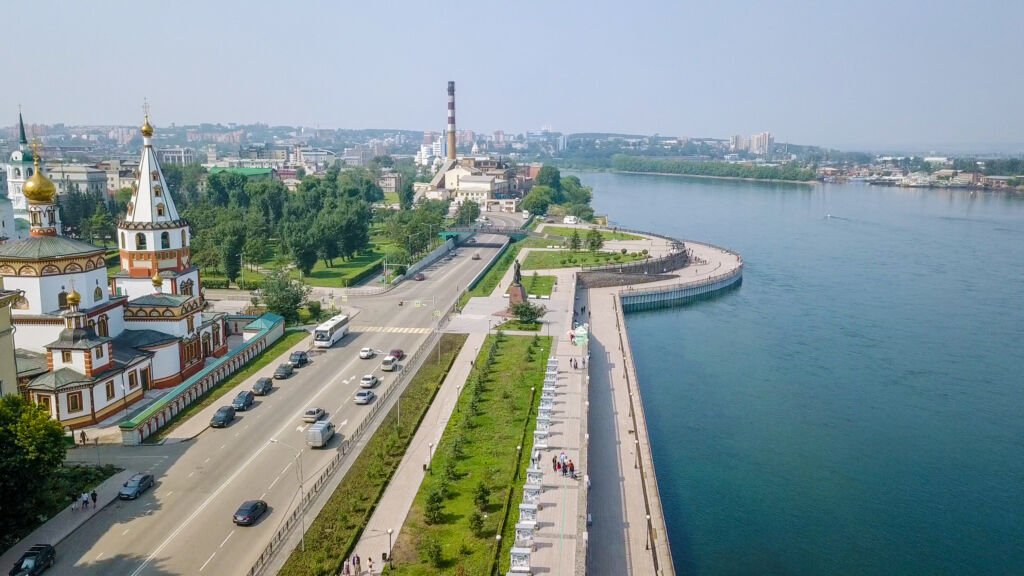Irkutsk is a major city in Eastern Siberia, Russia, located on the banks of the Angara River. It stands approximately 70 kilometers from the southern tip of Lake Baikal and serves as the administrative center of Irkutsk Oblast. The name comes from the Irkut River, which derives from a native word meaning “great water.” The city spans roughly 300 km² and has about 620 000 residents. Russian is the official language and Buryat and Yakut dialects survive in outlying areas. Alcoholic beverages are available in restaurants and state-licensed stores to anyone aged 18 and over; narcotics are strictly prohibited. Irkutsk holds the status of a regional capital and is governed by an elected mayor and city council. Law enforcement is provided by the regional police, and the Russian Army maintains training bases nearby.
History
Irkutsk’s history began in 1661 when the Cossack explorer Yakov Pokhabov built a wooden fort at the confluence of the Irkut and Angara rivers to secure trade routes and collect tribute from local Buryat tribes. By 1686 the settlement was granted city status under Russian imperial administration. The mid-17th and 18th centuries saw rapid growth as fur traders, merchants and exiled nobles—among them Decembrists such as Sergei Trubetskoy—transformed the fort into a bustling merchant town. Wealthy families funded churches, schools and civic buildings in the distinctive Siberian Baroque style, blending local larch wood craftsmanship with European influences.
During the 19th century Irkutsk became a key stop on the expanding Trans-Siberian trade network. In 1898 the first train reached the city, linking it to Moscow and Vladivostok. Steamships plied between Irkutsk and Listvyanka, ferrying goods and travelers to the shores of Lake Baikal. The city’s academic and cultural life blossomed: Irkutsk State University opened in 1918, and literary salons featured writers like Konstantin Paustovsky. The brutal years of the Russian Revolution and Civil War brought turmoil; the White Army held the city briefly before the Red Army captured it in 1920.
Under Soviet rule Irkutsk industrialized rapidly. A hydroelectric plant on the Angara began operation in 1956, powering aluminum smelters and factories. Timber processing and aircraft manufacturing emerged alongside mining of gold and rare metals in the surrounding taiga. The Soviet government established special research institutes to study permafrost, meteorology and lacustrine ecosystems, cementing Irkutsk’s reputation as a scientific center.
The upheaval of the Soviet collapse in 1991 challenged Irkutsk as factories closed and unemployment rose. Yet the city adapted by expanding tourism driven by attractions such as Baikal and the Historic Quarter of Irkutsk, where ornate wooden mansions survived. Restoration projects in the 2000s revived landmarks like the Epiphany Cathedral and the 130th Kvartal cultural street. Today Irkutsk combines vestiges of its imperial and Soviet heritage with modern cultural festivals, art galleries and academic conferences, affirming a layered identity shaped by centuries of exploration, exile and enterprise.
Industry
Irkutsk’s economy is anchored by energy, metallurgy and manufacturing. The Irkutsk Aluminum Factory processes bauxite shipped from Kazakhstan. Aircraft production at the Irkutsk Aviation Plant includes structural components for regional jets. Timber and pulp mills harness large boreal forests. Research institutes spin off technology in permafrost engineering and environmental monitoring. Brands such as Baikal water and Siberian cosmetics are gaining national recognition. The city hosts one of Russia’s largest hydropower stations and achieved record aluminum output in the early 21st century.
Flora and Fauna
The surrounding region features taiga forests of larch, Siberian pine and birch. Endemic plants like the Baikal scorpionweed adapt to cold climates. Wildlife includes brown bears, sable, elk and the endangered Baikal seal, known locally as nerpa. Western Siberian vipers and black widow spiders pose hazards to hikers. Domestic animals are primarily cattle and horses on dacha farms. Export of endangered species and plant specimens requires strict permits under CITES regulations.
Religion and Races
Orthodox Christianity predominates at about 60 percent of inhabitants, followed by non-traditional Christian movements and small Buddhist and Muslim communities. Census data show 30 percent identifying as non-religious. Ethnic Russians comprise roughly 85 percent, with Buryats, Tatars, Ukrainians and other groups making up the remainder. Religious traditions center on Easter, Christmas on January 7 and patron-saint festivals at city cathedrals.
Wars and Conflicts
Irkutsk saw little combat on its soil but contributed forces to major Russian campaigns from the Russo-Japanese War to modern peacekeeping. The Civil War of 1917–1922 brought White and Red Army engagements nearby. No recent terrorist attacks have targeted the city, but vigilance remains high, aided by CCTV and regional police. Military cemeteries near the airport commemorate those lost in both world wars.
Living Standard
Per-capita income in Irkutsk Oblast falls below the national average but is rising with new investments. Housing is relatively affordable compared to Moscow and St. Petersburg. Transparency International places Russia in the middle of global corruption rankings; local initiatives promote open-data portals and civic oversight. Quality-of-life indexes rank Irkutsk highly for environmental quality and cultural institutions.
Medicine
Healthcare is provided by public hospitals such as Irkutsk Regional Clinical Hospital and private clinics. Pharmacies operate daily, with emergency services on call. Tourists should carry valid health insurance and EU travelers can use EHIC agreements. No endemic tropical diseases exist; recommended vaccinations include tetanus and seasonal influenza.
Sport
Ice hockey, football and bandy are popular, with HC Irbis competing in regional leagues. Winter sports at nearby ski resorts draw enthusiasts for cross-country skiing and snowboarding. Rowing on the Angara and paragliding from Sinyushina Hill attract adventure seekers. Local athletes have represented Russia in the Winter Olympics in biathlon and speed skating.
Holidays
New Year’s Day and Orthodox Christmas on January 7 are celebrated with fireworks and church services. Victory Day on May 9 features parades along Karl Marx Street. City Day in June marks the city’s 1686 founding with concerts and river cruises. Baikal Day in August honors the lake’s ecosystem with clean-up efforts and environmental lectures.
Traditions
Siberian hospitality means guests are offered tea and pryaniki gingerbread. Visitors should remove shoes before entering private homes. Dressing warmly and wearing layers is customary. Tourists should respect elders by greeting with a slight bow and avoid loud conversations on public transport.
Interesting Facts
Irkutsk earned the nicknames Eastern Paris and Siberian Petersburg for its wooden architecture. The Decembrist Museum honors exiled revolutionaries who shaped local culture. The Angara Icebreaker, built in 1900, is preserved as a museum ship. Irkutsk hosted the Baikal Ice Marathon on frozen Lake Baikal and was featured in scenes from the film Mongol (2007). A 2004 flood submerged parts of the city amid record snowmelt.
Money
The Russian ruble is the official currency. Credit and debit cards are widely accepted; ATMs are located in all districts. Currency exchange rates are best at bank branches and official kiosks. Cash is required in markets and small cafés. Tipping 10 percent of the bill in restaurants is customary.
Household Details
Electricity is 220 V at 50 Hz with type C and type F sockets. Mobile coverage by MTS, Beeline and MegaFon ensures 4G throughout the city. Public Wi-Fi is offered at libraries, cafes and railway stations. Tap water is potable but many residents use filtered or bottled water.
Clothing
In winter wear insulated coats, hats and gloves for temperatures below −30 °C. In spring and autumn dress in layers with waterproof outerwear. Summer days can reach 25 °C, so light shirts, trousers and walking shoes are appropriate. Modest attire is recommended in religious sites.
Tourism
To explore Irkutsk and its surroundings fully, plan five to seven days. Three days for city highlights—Historic Quarter, Decembrist mansions, Angara embankment, and cathedral tours—and two to four days for Lake Baikal excursions in Listvyanka, Olkhon Island, and nearby nature reserves. Day trips to UNESCO-listed sites like the Lake Baikal region often start early and extend into evening.
Types of Tourism
Cultural tourism in museums, churches, and historic architecture. Nature tourism at Lake Baikal, national parks and hiking trails. Winter tourism for ice-fishing, ice-driving and cross-country skiing. Eco-tourism focusing on wildlife and environmental education. River tourism with boat cruises on the Angara.
List of Tourist Attractions
130th Kvartal – restored wooden architecture and cultural center.
Epiphany Cathedral – Siberian Baroque stone church from 1746.
Angara Icebreaker Museum – 1900 steam-powered ship on permanent display.
Taltsy – open-air ethnographic museum of Siberian village life.
Lake Baikal – world’s deepest freshwater lake, UNESCO World Heritage site.
List of Non-Tourist Attractions
Irkutsk State University – historic academic institution built in 1918.
Znamensky Monastery – centuries-old monastery off main roads.
Old Train Station – 1898 Trans-Siberian railway terminal.
Botanical Garden – research site with rare Siberian flora.
Local Cuisine
Posikunchiki – small meat pies often eaten as street food.
Omul – smoked Baikal whitefish served with lemon and herbs.
Solyanka – thick soup of meat, pickles and olives.
Pelmeni – Siberian dumplings filled with mixed meats.
Tea with pine nut syrup and gingerbread is popular.
Meals served: breakfast 8–10 AM, lunch 12–2 PM, dinner 6–9 PM. Street vendors vary; bottled water and hot food from busy stalls are safest.
Why Visit
Irkutsk offers a unique blend of Siberian history, wooden architecture, and access to the majestic Lake Baikal, making it a must-see gateway to Eastern Russia.
Safety for Tourists
Crime is low but petty theft can occur in crowded areas. No significant terrorist threats. Wildlife risks include ticks in summer and river currents. Seasonal floods pose hazards in spring. Public areas have CCTV, and emergency services are reachable by dialing 112.
Tourist Infrastructure
The city has a range of accommodations from hostels to four-star hotels. Restaurants serve Russian and international cuisine. English is spoken in major hotels and tour companies. Tourist information centers at railway stations provide maps and guides.
Entry Rules
Foreign visitors need a valid visa or e‑visa for Russia. Passport must be valid for at least six months. Customs restrict fresh produce, firearms, and large sums of cash over 10 000 USD without declaration.
Transport
Irkutsk is served by Irkutsk International Airport with flights to Moscow, Beijing, and domestic destinations. The Irkutsk railway station connects via the Trans-Siberian Railway. City transport includes buses, marshrutka minibuses, trams and taxis. Tickets are purchased on board, at kiosks or via transport apps.
Automobile
Driving is on the right. Tourists may rent cars with an international driving permit. No toll roads in the city. Speed limits are 60 km/h in urban areas, 90 km/h on regional roads. Winter tires are mandatory from December to March. Parking is paid in city centers. Blood-alcohol limit is zero for novice drivers and 0.03 percent for others. Fines are strictly enforced.
Noise Regulations
Quiet hours are 10 PM to 7 AM in residential zones. Construction noise is limited to daytime hours.
Daily Budget Tourist
Budget travelers need approximately 2 000 RUB (25 USD) per day for hostels, street meals and public transport. Midrange budgets of 5 000–7 000 RUB (65–90 USD) cover three-star hotels and restaurant dining. Luxury budgets start at 10 000 RUB (130 USD).
Not Recommended or Forbidden
Drones over city landmarks require special permits. Avoid political demonstrations. Feeding wildlife around Baikal is prohibited. Public nudity is illegal.
Climate
Irkutsk has a continental climate with extremely cold winters down to −40 °C and warm summers up to 30 °C. Best visiting times are June to August for lake excursions and February to March for ice festivals.
Travel Tips
Pack thermal clothing for winter, sun protection for summer, and always carry a photocopy of your passport. Learn basic Russian phrases for rural areas. Book lake-Baikal accommodations well in advance in high season.
- Haruto Takahashi Found Pirate Treasure in Madagascar
- Normandy
- Greenland
- Colombia
- Daring to Explore Again
- What to know when going to Brazil ?
- Shakira — Waka Waka (This Time for Africa)
- Sanin Coast Road Trip
- Uzbekistan
- About
- Travel to Cambodia
- From a Scientific Point of View: The Grand Canyon
- 12 of the best places to visit in April in Europe: beaches, Easter, cities, and adventures
- Turkmenistan
- Panama
- The Most Dangerous Tourist Destinations for Women: Where to Travel with Extreme Caution
- Chile
- Kyrgyzstan
- Abkhazia
- Tourism crime in Amsterdam: how to avoid becoming a victim











